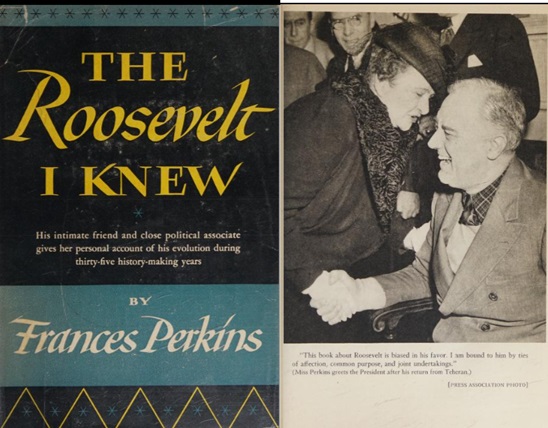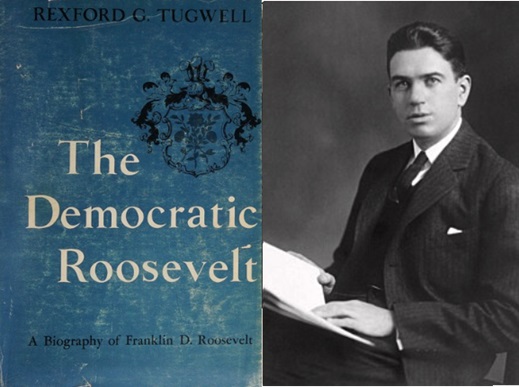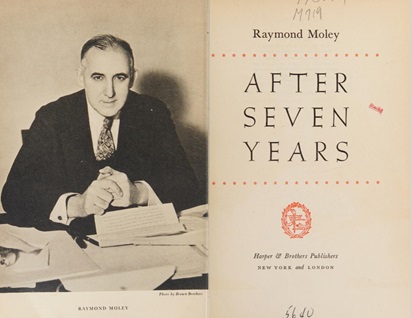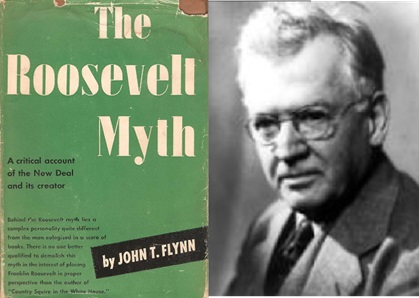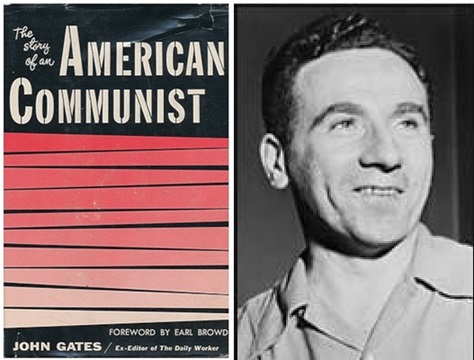|
| |
Frances Perkins, The Roosevelt I Knew (1946)
Summary Close friend and colleague, openly biased. Thought FRD’s impact was “incredible”.
Frances Perkins was an American workers-rights advocate and the first woman ever to serve in a presidential cabinet, as US Secretary of Labor from 1933 to 1945, the longest serving in that position. She was a close friend of the Roosevelts, and was open from the start about her book, which followed close-on from FDR's death: it was “not a biography. It is biased in his favour.” Meeting as young people before WWI, Frances found Roosevelt cold, uninterested in the problems of social welfare/labour. and inexperienced in politics. However, this changed with his years in the Navy Dept., and with polio. He remained for her a complicated man who mixed drive, sympathy and detachment with personal contradictions, “capable of almost childish vanity”, and of banter and teasing, but with a fierce dedication to the improvement of living condition for the great mass of mankind, and who turned out to have “immeasurable qualities as a wartime leader”. “There was undoubted conflict within him. He was all these things – the rich man's friend, the poor man's brother, the stern puritan conscience, the easygoing, indulgent, and forgiving friend of the irregulars. These conflicts, however, did not result in neurotic stagnation, but in life and movement in many directions; and shrewd planning kept them from ruining one another.” “He made an indelible impression on his own country and on the world, changing the direction of political thought through knowledge of human needs and suffering and emphasis upon the provision of the good life for the common man. He grew to greatness by a full utilization of all of his talent and personality; he began where he was and used what he had. He ignored his handicaps, both physical and intellectual, and let nothing hinder him from doing the work he had to do in the world. He was not born great but he became great. The words most often on his lips to describe what he regarded as the good democratic society were: ‘free’, ‘fair’, and ‘decent’.” Her final image of the Roosevelt she knew was meeting a young soldier in the White House after Roosevelt's death: “[He] sighed as I nodded to him and said: ‘I felt as if I knew him.’ (A pause.) ‘I felt as if he knew me – and I felt as if he liked me’.” If you are faced with an interpretations question on Perkins, you need to ask how much her opinion is compromised by her closeness to, love of and bias for the President who gave her her role in politics.
|
The Roosevelt I Knew is accepted as an unpredeneted insight into FDR by someone who was both a friend and a colleague. • You can read the whole book here.
|
Rexford Tugwell , The Democratic Roosevelt (1957)
Summary Young colleague who “loved” FDR but disagreed with him and was ‘dropped’. Thought FDR “a man of enormous consequences” who did “his best” but was held back by the reactionaries.
Rexford Tugwell was a left wing economist, recruited ont FDR's 'Brains Trust' of experts by Raymond Moley, who for a time was FDR's 'No1 Brain Truster' and close advisor. Never wholly in tune with FDR's policies, he fell out of favour and resigned in 1936. Tugwell openly stated that he "loved" Roosevelt, but that did not stop him have significant disagreements and criticisms. Accoring to Tugwell, FDR was characterised by "concealment". He thought he was in power by divine appointment. He “maneuvered endlessly for political preferment” – a struggle which was “neither clean nor pretty” – and was ”a tough customer in a fight”. But his purpose was always “to give Americans security in life, and to free the world from totalitarianism”. The accusation that FDR was a dictator was "fanciful", but it seemed to send FDR into a "panic". Roosevelt was, thought Tugwell, “a man of enormous consequences”. Politically "a little left of center", FDR disappointed Tugwell by his failure to change the capitalist system, simply trying to get it to behave ... a policy Tugwell likened to "planting shrubbery on the slopes of a volcano”. But Tugwell thought National Social Security and the United Nations were genuinely great achievements, and opined that “with what he had at the time, he had done his best” ... espcially as he was held back by “the reactionaries in Congress" and “the old gentlemen on the Supreme Court”. “When Roosevelt died our society was much further forward than when he became President. It is true that there was a change from the old rugged individualism and laissez-faire ideas towards more government regulation. And a move away from individual responsibility for sickness, unemployment and old age to security for all. This helped those with the least power to bargain. We are a lucky people. If it had not been for this democrat we might have fallen to a dictatorship. For that was being talked about when he took charge.” “I have tried to show in this book … how he rose to the occasions of national crisis, how he sometimes dodged and temporized in the interest of eventual victory, and how the obligations he felt, as well as the lessons he learned, controlled his actions. The force within him always demanded and got some kind of response, although it was often masked by falsification of intentions or concealment of objectives.” If you are faced with an interpretations question on Tugwell, you will wish to question his clearly conflicting feelings for Roosevelt, who eventually sidelined him; was he capable of an objective evaluation of the President?
|
The Democratic Roosevelt is accepted as critical-but-fair insight into FDR by someone who worked closely with him. • You can read the whole book here.
|
Raymond Moley, After Seven Years (1939)
Summary Senior adviser who resigned because he disagreed with the Second New Deal, and because he thought FDR had been corrupted by power. Thought “Roosevelt's administration has achieved much”, but had also caused “serious injury” to the nation.
Raymond Moley was an economist, key advisor of Roosevelt, the man who pulled together FDR's 'brains trust', and the speechwriter who first came up with the term: 'New Deal' ... and many other New Deal policies, if you believe his book. Moley pulled awar from Roosevelt when he began to attack the rich and introduce left-wing policies in the Second New Deal ... eventually resigning in 1936. His book, dubbed "indiscreet" by one reviewer, attacks Roosevelt's character as much if not more than his policies. “It was Roosevelt's special fortune that he became President when, in economic calamity, progressivism at last won the adherence of a majority of our people. In that sense he was handed a torch that had been carried by others for generations.“.” “I would not have believed that Roosevelt would succumb to the unlovely habits of ‘telling, not asking,’…. Nor did I foresee the growth of that irritable certitude that led Roosevelt to ascribe self-interest or cowardice or corruption or stupidity to people who questioned the rightness of his impulses. I could not imagine that the quality of refusing to admit defeat would become the incapacity to admit error. I could not imagine Roosevelt's envisaging that people must either be ‘for him,’ or ‘against him.’ I could not imagine that a growing identification of self with the will of the people would lead him on to an attempted impairment of those very institutions and methods which have made progressive evolution possible in this country. But then, I had not yet learned that no temperament, however fluid, is immune to the vitrifying effect of power.” “Roosevelt's administration has achieved much. It has outlawed many abuses... There will remain, after Roosevelt has left office, a vastly changed philosophy of business enterprise, an improvement in the methods of social-welfare activities. These gains are incontestable. But it is difficult to reconcile them with what they have cost. It is not alone that immense treasure has been spent..., that, after seven years, investment remains dormant, enterprise is chilled, the farmers' problem has not yet been solved, unemployment is colossal. It is that thousands of devoted men and women … have been alienated…. Their position on such perversions of progressive doctrine as the Court-packing plan has been made a test of personal loyalty…. Even the submerged third, whose interests the President has so persistently championed, have been thoughtlessly injured. Extravagant promises have raised expectations far beyond any reasonable hope of realization. But perhaps the most serious injury that has been done the cause of orderly progress has been the impairment of the nation's unity by the repeated suggestion that benefits can come to one group only at the expense of others.” If you are faced with an interpretations question on Moley, you will want to ask how far his criticisms are the result simply of bitter revenge?
|
After Seven Years is accepted as an "indiscreet" account of FDR by one of his most senior colleagues. • You can read the whole book here.
|
John T Flynn , The Roosevelt Myth (1948)
Summary Bitterly opposed to FDR’s policies from political and personal dislike. Thought his success “propaganda”.
John Flynn was a journalist. He was a strongly advocate for fair competition, and a key influence on President Roosevelt's National Industrial Recovery Act. However, he opposed the New Deal as "a degenerate form of socialism and debased form of capitalism", and by 1936 had decided that: "We seem to be not a long way off from the kind of Fascism which Mussolini preached in Italy before he assumed power; and we are steadily approaching the conditions which made Fascism possible". He is open that “this book is a critical account of that episode in American politics known as the New Deal”, to redress the books about FDR which "feed the legend of the world conqueror and remodeler" and to dispel “the illusion that Roosevelt performed some amazing feat of regeneration for this country”. Because: [He did not restore the economy, he:] "carried on a ceaseless bombardment of it, continued to brow-beat it, to denounce it, to warn people against it and to subject it to a dozen crack-brained, semi-revolutionary schemes, including deficit financing, inflation, utopian panaceas and the everlasting preachment that profit was evil,...” [He did not restore the political system, but used his powers as President:] “to break down the power of the states and to move that power to Washington and to break down the power of Congress and concentrate it in the hands of the executive”. [He did not build a system of security, and;] “to say that Roosevelt roused in the people a social consciousness is absurd. There has always been a social consciousness in our people”. Flynn was an isolationist, and key member of the America First Committee which tried to keep out of WWII and believed that Roosevelt had deliberately not warned Admiral Kimmell of the attack on Pearl Harbor in order to manufacture an excuse to go to war: “As for the great war for freedom and democracy, it would be well to get that clear in our minds…. Roosevelt's star was waning sadly in 1938 when he had 11 million unemployed…. All his promises had been defaulted on. The cities were filling with idle workers. Taxes were rising. The debt was soaring. The war rescued him and he seized upon it like a drowning man.”. “The figure of Roosevelt exhibited before the eyes of our people is a fiction. There was no such being as that noble, selfless, hardheaded, wise and farseeing combination of philosopher, philanthropist and warrior which has been fabricated out of pure propaganda and which a small collection of dangerous cliques in this country are using to advance their own evil ends.” If you are faced with an interpretations question on Flynn, you will need to point our that a Congressional Committee found no evidence that FDR had conspired to keep Kimmell in the dark. Flynn's interpretation is valid, but you need to appreciate that he comes at every bit of evidence determined to vilify his subject.
|
The Roosevelt Myth is marketed as a book that 'demolishes' FDR: "Flynn accomplishes this demolition so thoroughly, and with a bitterness so poetic, that readers of this volume, whatever their politics, will never see FDR in quite the same way again.“ • You can read the whole book here.
|
John Gates, The Story of an American Communist’ (1959)
Summary A committed Communist at the time of the New Deal, who changed his evaluation of FDR and the New Deal as instructed by Stalin.
John Gates discovered Communism as a student, where he “found the answers to the causes of the Depression, socialism and a world brotherhood of man”. He became an activist, organiser-administrator, and editor of The Daily Worker, the Communist Party newspaper. We hear in his autobiography that he was arrested twice during the Roosevelt years, but the book deals also with other aspects of his life – for instance that in 1937 he left America to fight againsst the fascists in Spain, and that in 1958 he left the Communist Party, disillusioned with Stalin's policies. “We planned a demonstration of the unemployed during President Roosevelt's inauguration on March 4, 1933. I was chosen to open the demonstration and was arrested because we didn’t have a permit to hold it. Listening to the broadcast when I was in jail, it did not sound exactly like a New Deal to me. I did not believe the President and had no confidence in him. He announced the closing of the banks and the introduction of a New Deal for the American people. It sounded to me like a possible dictatorship.” The problem for American Communists was that they took their orders from Stalin, and had to keep changing their opinion:
"[In 1940] we attacked the Roosevelt administration once again as we had done back in 1933, calling it dictatorial and profascist. Although we said we supported neither side, in effect our main attack was against the West. If you are faced with an interpretations question on Flynn, you will want to point out that until 1958 he was only saying what he had been told to say, and that his Communist beliefs overrode any objective opinion.
|
The Story of An Amerrican Communist is Gates account of his life and politics; it is referenced only as a personal view. Even the inroduction (by Earl Browder, spy and disgraced leader of the US Communist Party) suggests that Gates was too close to his material full to understand it. • The book is unavailable to view or buy online. |
|
| |
